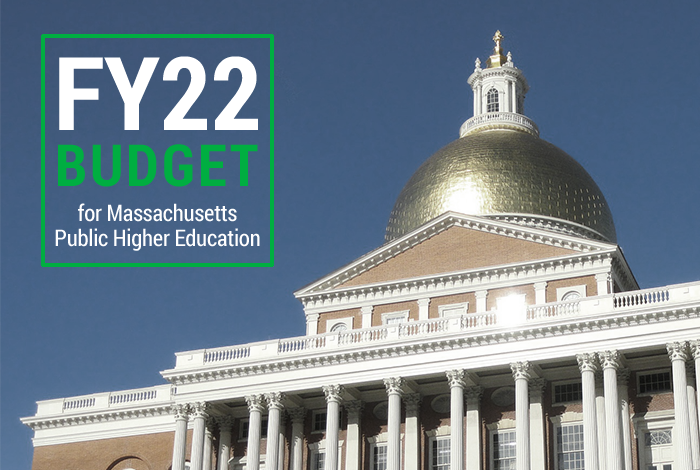
The Massachusetts Board of Higher Education approved its budget recommendations at its December 15th meeting for the fiscal year that begins on July 1, 2021.
The Board of Higher Education’s Budget Recommendations for FY22 begins with an introductory statement that affirms the Board’s commitment to the Equity Agenda. While there continues to be uncertainty about COVID-19 and its disruptive and lasting effects, there is universal acknowledgment of the disproportionate economic impacts of the pandemic on minoritized students and communities. The budget proposal for FY22 builds upon recent funding decisions for FY21 made by the legislature and approved by the Governor to break down the barriers to opportunity and success among traditionally underrepresented and underserved students by investing in programs that promote greater access and affordability, policy innovations, student supports, culturally relevant pedagogy, and other strategies aimed at achieving more equitable outcomes.
On December 3, 2020, legislative leaders reached agreement on the long awaited FY21 budget which was signed by the Governor on December 14th. Among the highlights in the annual funding bill were significant increases for higher education particularly in the areas of financial aid, student supports, and formula funding which combines foundational supports as well as incentives to reach performance goals. As the Coronavirus continues to cause disruption and uncertainty for our future, these substantial investments in students and their future could not come at a more crucial time. “The budget increases for higher ed in the FY21 budget are particularly helpful to a system that provides educational opportunities, is a major employer, and is a driver of business growth throughout the Commonwealth,” said Rep. Jeffrey N. Roy (D-Franklin), House Chair of the Joint Committee on Higher Education. “Our colleges and universities faced a number of unexpected revenue losses and expenses from the COVID-19 outbreak, and these funds will help them recover and position themselves moving forward. Massachusetts has historically mined the human intellect, and these investments demonstrate the legislature’s commitment to ensuring that all citizens have access to higher education opportunities.”
The Legislature and the Governor recently approved an increase of $10M in need-based financial aid in FY21 for in-state students attending Massachusetts state universities. Modeled on the MASSGrant Plus program which provides last-dollar aid to full- and part-time community college students, this expansion will help thousands of additional students cover their unmet need for tuition and mandatory fees, with additional support for books and supplies. The Board of Higher Education is recommending an additional increase of $26 million for FY22 which will cover the unmet need for up to 23,000 full-time Pell-eligible students attending any 4-year public higher education institution in Massachusetts. This investment will help address a persistent need for low-income students enrolled in public colleges and universities, and eliminate cost as a barrier to access, opportunity, and success.
For FY21, the legislature funded a new program, SUCCESS (Supporting Urgent Community College Equity through Student Services), to help community colleges by providing wraparound student supports with the goal of increasing persistence and attainment rates, particularly among students of color. Interventions such as peer mentoring, academic skills workshops, transportation stipends, dependent care supports, as well as targeted academic, career, transfer, and scholarship advising have proven highly successful across the country. Student supports is one of the key pillars of the Equity Agenda, and this program has the potential of having a transformative impact in the lives of students for years to come.
The Board recommended $5 million for the Performance Management Set Aside, a $2.4 million increase over FY21. This program supports the Higher Education Innovation Fund (formerly known as the Performance Incentive Fund or PIF) which continues to support competitive grants to campuses and consortia, as well as certain systemwide initiatives, to make progress on the goals articulated by the BHE. This program rewards best practices, innovative strategies, and cross-system collaboration to support student success and other system-wide goals. Funds are also used to facilitate data-informed decision-making and advance the use of data analytics and visualization tools to drive performance and accountability.
Additionally, the Board recommended an increase in the Formula Funding accounts of approximately 2% of base appropriations. Formula Funding was first introduced in FY13 and combines foundational supports as well as allocations based upon prior year performance. At their peak, these accounts were funded at $20 million and $8 million for the Community Colleges and State Universities respectively. The Board’s recommendation would provide adequate funding to incentivize performance and invest in foundational supports to improve educational outcomes for all students. By combining both adequate foundational supports with performance-based funding, campuses will have more effective tools to achieve statewide objectives and improve student outcomes.
Early College provides structured and supported pathways for racially minoritized, low-income students, first-generation students, and/or students interested in high-demand, STEM-related disciplines. National research has shown a positive correlation between Early College programs and higher college-going rates among historically underserved and low-income high school students. At its October meeting, the Board adopted a resolution to commit to seeking sustainable funding to support the expansion of Early College. The $6.4 million recommended by the Board would address the projected cost of the program’s expansion and keep the program cost free to participating high school students.
These recommendations will be considered by the Executive Office of Education and the Governor’s Office as they prepare the Governor’s Budget Recommendation for all of state government.